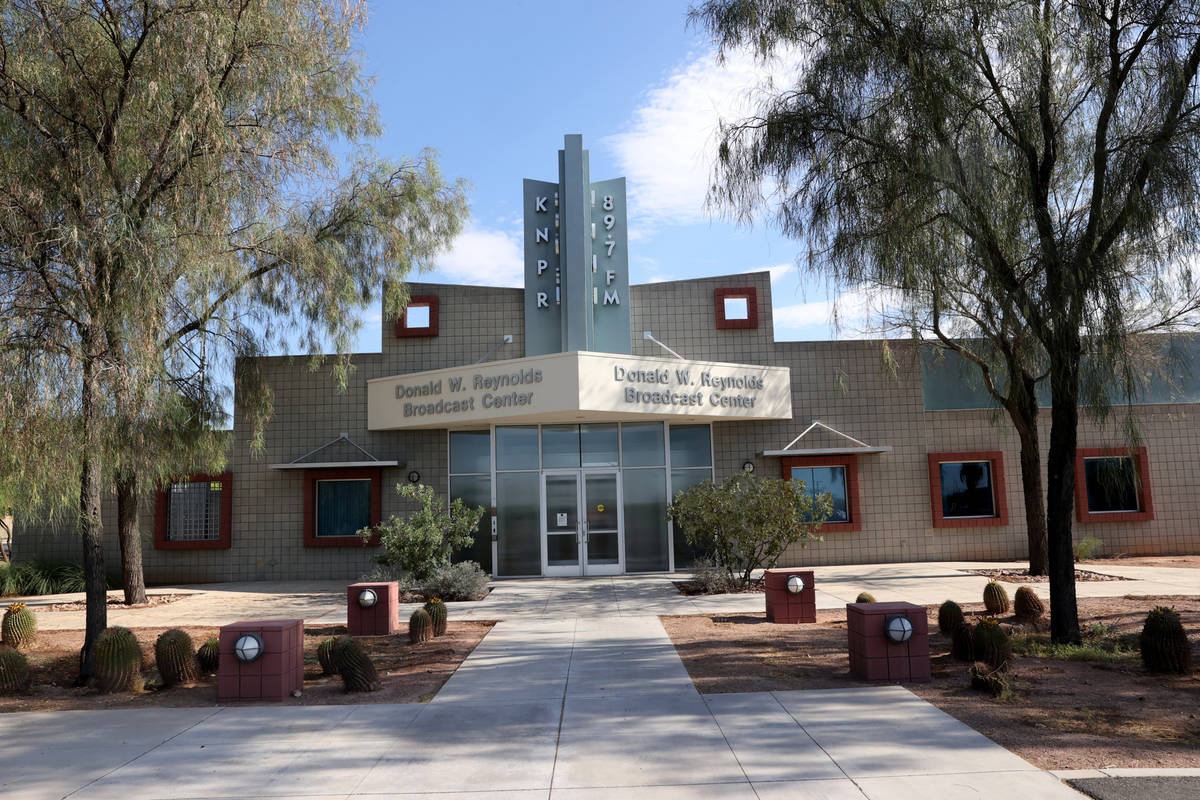
Once close to the edge of bankruptcy, Las Vegas’ public radio station went through severe budget cuts and a challenging pandemic to now stand in good shape, the president and CEO said this week.
Nevada Public Radio announced “severe cash flow issues” in summer 2019, causing then-CEO Florence “Flo” Rogers to resign from leading the National Public Radio member station and elevating the station’s then-Board of Directors Chairman Jerry Nadal to the top role.
Two years of budget cuts, layoffs, asset sales and restructuring have put the station in better standing.
‘In a crunch’
Leaders found the station had nearly $2 million in debt, Nadal said. Part of the reason, they realized, was because of the unsuccessful investment in a station in Reno.
“We didn’t realize how much debt was on the books and where the money was being spent,” Nadal said. “The board would get stuff in broad categories, so frankly, at the time the board did not understand exactly where they were until the previous CEO came to the board and said, ‘Hey, we’re in a crunch.’ And they were in a significant crunch that couldn’t cover the bill that they had.”
Station leadership spent late 2019 and early 2020 addressing the debt, using $2 million in endowment funds to pay down “a majority of” the balance, Nadal said. They also chose to sell a radio transmitter in St. George, Utah, but kept the station in Reno and Carson City to ensure KNPR’s signal reached more than 90 percent of the state.
In 2019, KNPR leadership laid off the staff at the Reno station, which was focused on alternative music programming. Now, the station plays KNPR programming from 5 a.m. to 8 p.m. and jazz format from 8 p.m. to 5 a.m.
Pandemic impact
But a few months later, the coronavirus pandemic added another financial hurdle during its 40th year on air. The station had significant budget restructuring for the 2020 fiscal year, October 2019 to September 2020. KNPR lowered its operating budget from nearly $9 million in funding sources and $8.64 million in expenses in 2018-2019 to $6.76 million in revenue and $6.63 million in expenses the following fiscal year, the annual report shows.
KNPR had 295,000 weekly listeners in the 2019 fiscal year, compared with 162,900 in 2020, according to annual reports. It also had 13,244 members in 2019 but dropped to 11,999 in 2020, disrupting a year-over-year trend of growing membership.
KNPR’s experience in 2020 is not unique. Many public media stations and studios had revenue drop as listeners stayed home and away from their car radios and advertisers tightened their belts. A Corporation for Public Broadcasting analysis found revenue for public television and radio stations declined 5 percent in fiscal year 2020, most notably in underwriting, foundation funding and investment income, according to a report by the public media trade publication Current. Many stations adjusted with staff reductions.
Smaller stations reported they expect a more difficult recovery, according to the report. Some noted they did not return to revenue seen before the Great Recession.
At KNPR, the station used increased member contributions, two Paycheck Protection Program loans, some federal grants and laid off 12 positions to push through the year. It received $660,200 in PPP funds in April 2020 and $660,230 in February, federal data show.
Also, the station received grants disbursed through the CPB, which acts as the steward of the federal government’s investment in public broadcasting, through both rounds of coronavirus-related aid in 2020 and 2021. In 2020, KNPR received $112,136 from the CARES Act. It received an additional $369,093 through the American Rescue Plan Act this spring.
Looking forward
Nadal said those grants, plus bequests from three longtime listeners’ wills and support from member drives, helped pay off a mortgage on the radio station in Reno and replenish the endowment accounts.
“We came out of that fiscal crisis and through the pandemic in very good shape for a nonprofit organization,” Nadal said. “I’m happy where we are. We’re hiring people that we had to reduce — we’re actually increasing the size of the staff to cover the additional reporting and programming that we’re doing.”
All of the change in the past two years has allowed the station to focus on new goals, he said. It wants to expand local programming. There are efforts to expand successful series of 2020, such as a five-part program on race and racism in Nevada and a podcast about indigenous issues called “Native Nevada.”
Joe Schoenmann, KNPR’s news director and “State of Nevada” host, said the new programming mission is an exciting new challenge that listeners seek out. He pointed to positive responses to the “Native Nevada” podcast.
“It’s really exciting and daunting because we’re not just hiring back people, but we’re really branching into other areas,” Schoenmann said. “But listeners have really come through, as they usually do, with their support. It’s exciting. We want to expand our coverage with listeners in mind. They come through supporting us as well, so it’s sort of a symbiotic and mutual relationship.”
Station leaders also envision experimenting more with radio theater after a successful “Live from Area 51!” play, similar to “War of the Worlds,” aired the day before Thanksgiving. Nadal also envisions extended “State of Nevada” and weekend local programming.
“We are living within our means,” Nadal said. “We actually should end this year with a bit of a surplus, which puts us in good stead moving forward. I think a lot of what we’re able to do now is really what we’ve been wanting to do for a while, which is increase our local content and local programming.”
McKenna Ross is a corps member with Report for America, a national service program that places journalists into local newsrooms. Contact her at mross@reviewjournal.com. Follow @mckenna_ross_ on Twitter.